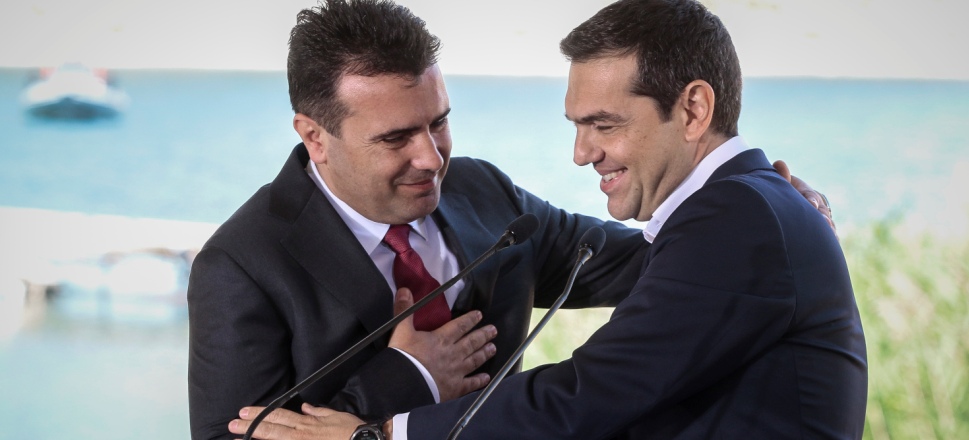By Aris Ravanos
Main opposition SYRIZA leader and former PM Alexis Tsipras while on a visit to Northern Macedonia today declared that implementation of the Prespa Agreement that he and Northern Macedonia’s Prime Minister Zoran Zaev signed (June, 2018) is the best answer to the enemies of the accord and the key to the future.
Tsipras was attending the “Prespa Forum Dialogue”, where he sought to burnish his leadership profile with messages to Balkan countries such as Bulgaria and Kosovo and to the EU on all open issues (Northern Macedonia’s and Albania’s EU accession course).
Tsipras fiercely defended the agreement, declaring that progressive politicians know how difficult it is to break down walls but that it is easier when you build bridges with your neighbour. He maintained that conservatives do not break down walls for fear that the walls would crush them and end their careers.
Addressing Zaev directly, Tsipras said that the two of them as progressive politicians approved the ownership of an honourable solution.
Tsipras also criticised the current government on two points. “Greece must monitor much more intensely the implementation of the Prespa Agreement and must ratify as soon as possible the pending to memorandums and Agreement,” he said.
Tsipras dropped a barb against Zaev as regards the latter’s remarks regarding the Football Federation of North Macedonia in which he omitted the word north.
“We must not do the bidding of conservative forces and in some cases avoid implementation of the agreement for the sake of fleeting political gain,” Tsipras said.
Progressives show the way
Tsipras said that the first reason the Agreement was concluded is that it brought together progressive politicians who believe the differences between states must be resolved in a mutually acceptable and peaceful manner, based on international law.
“For us, war is not the solution, nor is a Cold War based on frozen clashes. If you permit a clash to fester for a long time then the ice melts only through clashes as we see in many parts of the world,” he said.
“That is what distinguishes us from nationalist politicians who keep building ever higher walls. That also distinguishes us from many conservative politicians who keep the walls standing.”
Tsipras extolled Zaev’s stance as well as that of their foreign ministers who negotiated the agreement, Nikos Kotzias and Nikola Dimitrov.
‘Others will not solve the problem’
A second reason the Agreement was reached, Tsipras said, is that the two sides did not believe that others would solve the problem.
“We had the support of the UN and the valuable input of [former UN envoy] Matthew Nimetz. We had the support of the international community, the EU and the US, but we never looked elsewhere to find the political will for a solution. Greece persuaded the EU to look closely at the Western Balkans and to unfreeze the accession course of candidate-countries.”
Tsipras was referring to the freezing of EU accession talks with Albania and North Macedonia, and he called on Bulgaria to take a big step.
“I know very well how difficult it is to find solutions and ways to deal with sensitive issues. Yet it is necessary for Bulgaria to take this step with North Macedonia and hold an inter-governmental conference as soon as possible. It is necessary for Bulgaria to signal that it is an integral part of the future of the Balkans which we can only build together, and not in opposing camps.”
“Implementation of the Prespa Accord must continue faithfully and particularly as regards all public organisations and entities. It must also include enforcement of the June, 2019, agreement on revamping school books. This is the only way to build trust between us and to advance the EU accession course of North Macedonia, when its difference with Bulgaria is resolved,” Tsipras underlined.
Tsipras borrowed a line from Bertolt Brecht – “I escaped from the shark, I bagged the tigers, I was eaten up by the bedbugs. – in order to assert that the bedbugs will multiply as long as the Prespa Agreement is not enforced.
“That is why it is very important for Greece – as a true pillar of peace and stability – to monitor much more intensively the implementation of the Agreement and to take important steps. It should organise in Athens this year the Second Supreme Cooperation Council meeting between the two countries so as to open the way for many new agreements. It must also ratify as soon as possible the pending memorandums and the pending agreement and of course move forward with the work of the trademarks committee.”




